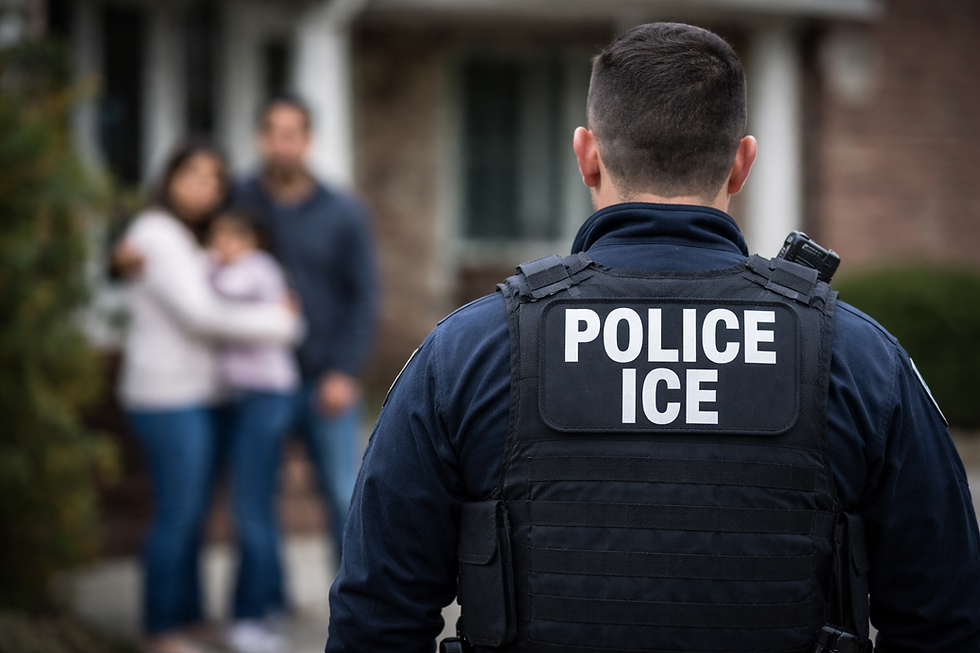Impact on America's Child Care System: How Trump's Immigration Crackdown Affects Families and Providers
- Viktor A. De Maio
- Mar 13, 2025
- 4 min read

Introduction
The Trump administration’s aggressive immigration enforcement policies are causing widespread concerns about their impact on America’s child care system. With immigrants making up a significant portion of the child care workforce, crackdowns on undocumented workers and stricter immigration laws could lead to staffing shortages, increased costs, and disruptions in early education.
Families, particularly working parents, rely on affordable and accessible child care. If immigration policies continue to restrict the labor supply, experts warn that the quality, availability, and affordability of child care could deteriorate, leaving many families without viable options.
This article examines the connection between immigration and child care, the potential consequences of Trump’s policies, and what the future holds for providers and families.
The Role of Immigrant Workers in Child Care
How Many Child Care Workers Are Immigrants?
According to labor data, approximately 20-30% of child care workers in the U.S. are immigrants.
In states like California, Texas, and New York, immigrant representation in the child care sector is even higher, reaching up to 40%.
Many immigrant workers in child care are undocumented or on temporary work visas, making them particularly vulnerable to deportation and employment restrictions.
Why Immigrants Play a Key Role in Child Care
Affordable Labor: Immigrants often fill low-wage jobs in child care, keeping costs manageable for working families.
Cultural and Linguistic Diversity: Many immigrant workers serve bilingual families, helping children learn multiple languages at an early age.
Workforce Gaps: The shortage of American-born workers in the child care industry has made immigrant labor essential.
How Trump's Immigration Policies Impact Child Care
Deportation and Workforce Shortages
The Trump administration has increased deportations and worksite raids, directly affecting industries dependent on immigrant labor, including child care.
Stricter employment verification (E-Verify) requirements are forcing child care centers to fire undocumented workers or risk penalties.
Deportations of undocumented workers are creating staffing shortages, especially in states with large immigrant populations.
Fewer new immigrants are entering the child care workforce due to visa restrictions and legal uncertainties.
Rising Costs for Families
With fewer available workers, child care providers must:
Raise wages to attract new employees, increasing operating costs.
Hire less-experienced workers, potentially affecting quality.
Pass costs onto parents, making child care less affordable.
Low-income families are particularly vulnerable, as they rely on affordable child care options to remain in the workforce.
Disruptions in Early Childhood Education
Staff shortages lead to higher child-to-teacher ratios, reducing personalized attention for children.
Daycare centers may close or cut hours, leaving parents scrambling for alternatives.
Fewer bilingual and culturally diverse staff may impact children from immigrant families, making it harder for them to adjust to school environments.
Long-Term Consequences for the Economy
Impact on Working Parents
Without reliable child care, parents—especially mothers—may leave the workforce or reduce work hours.
Businesses may suffer productivity losses, as employees struggle to balance work and child care.
Low-income and minority families will be disproportionately affected, widening economic inequality.
Slower Economic Growth
The child care industry contributes billions to the U.S. economy, supporting millions of working families.
Workforce shortages could stagnate economic growth, as parents face higher child care costs and limited options.
Responses from the Child Care Industry and Lawmakers
Efforts to Protect Immigrant Workers
Child care providers are lobbying against harsh immigration enforcement, warning of industry-wide labor shortages.
Advocacy groups are pushing for legal pathways to allow immigrant workers to continue filling essential roles in child care.
State-Level Solutions
Some states are expanding access to legal work permits for child care workers.
Local governments are offering financial incentives for child care providers to stay open despite worker shortages.
Democratic Opposition to Trump's Policies
Democratic lawmakers have introduced bills to protect immigrant workers in essential industries, including child care.
Some states are defying federal immigration enforcement, providing safe havens for undocumented workers in critical sectors.
Key Takeaways
Trump’s immigration enforcement policies are causing labor shortages in the child care industry, making it harder for providers to stay open.
Families are experiencing rising costs and fewer child care options, disproportionately affecting low-income households.
The broader economy could suffer as parents struggle to balance work and child care, reducing workforce participation and productivity.
FAQs
Why are immigration policies affecting child care workers?
Many child care workers are immigrants, and stricter immigration enforcement, deportations, and visa restrictions are reducing their ability to work legally.
How will this impact parents and families?
Parents may face fewer child care options, higher costs, and potential disruptions in early education, making it harder to balance work and family life.
Are there any efforts to fix this issue?
Some states and advocacy groups are pushing for legal protections for child care workers, but federal policies continue to restrict immigrant employment.
Conclusion
The Trump administration’s immigration crackdown is reshaping America’s child care system, causing workforce shortages, rising costs, and disruptions for families. While immigration enforcement remains a political priority, its unintended consequences are affecting working parents, child care providers, and the broader economy.
As the debate over immigration and labor policies continues, the future of affordable and accessible child care depends on whether lawmakers can balance border security with economic and social stability.
Need Help with Your Immigration Case? 📢💼
At De Maio Law, PLLC, we are here to guide you every step of the way. Don’t face your case alone!
💪✨ Schedule a consultation today and find out how we can help you.
📞 Call us at (786) 232-9120 or,💻 Book your appointment at: info@demaio-law.com







Comments